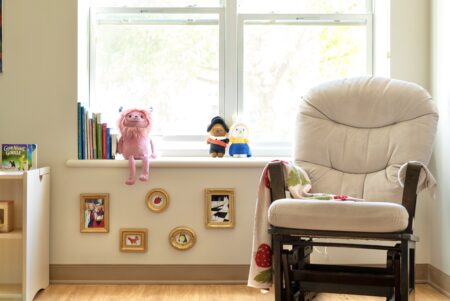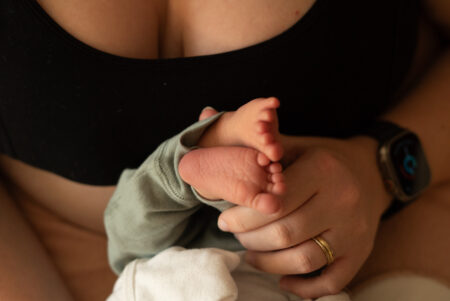Two years ago, I suffered an ectopic pregnancy—my third pregnancy loss in a row, and by far the most brutal and emotionally devastating. At the time, my pain was too intense to share with many people, and I kept both that and my prior miscarriages to myself. Several years on now, and with a living child, I have the emotional space to be able to share what that experience was like for me.
Ectopic pregnancy comes up often in the news in this particular historical moment, in part because of the unique implications it has for legislation around pregnancy and abortion. While I often see it used as a kind of buzzword, I rarely see it compassionately discussed or understood, in part because it is one of the rarer (and more dangerous) forms of pregnancy loss. My hope in sharing this is to humanize these news stories to you.
Every pregnancy loss is different, and other mothers may experience their pregnancies differently than I did. My ectopic pregnancy was life-threatening, extremely traumatic, and also—for us—a deeply wanted pregnancy that I viewed, and still view, as a baby. Thank you for treating my story with compassion.
On the morning they gave me the injection, I stood in the shower and talked to the baby I wouldn’t get to have. I told her I loved her, that I would always love her; that I was so desperately sorry. That it wasn’t her fault or mine. That I would have given anything to have her there with me, but that she needed to go on before me so I could stay to raise her future siblings. I wept, but in that moment I cried like a mother: holding it together for her instead of me.
It was hours later, standing in a dim room in some winding corridor on the fifth floor of a hospital, that I broke. I held my husband’s hands and shook as they put the needle in me. As I felt the burning flush of medication seep into my skin, I cried so hard that I saw the nurse wipe away her own tears.
I remember that moment in crystal-clear detail. The color of the walls, the look in my husband’s eyes. The doctor’s voice as she told me, “Brave girl. The hardest part is over now.” Minutes later, in the elevator, I looked myself in the eye, knowing that a part of me had died in that room.
Everything after that is a fog. There were days. There were hours spent on a couch. I must have eaten. I would have showered. But mostly, I lost myself. In the moments I could bear to visualize it, I imagined my soul as the tiniest possible thing, curled up in the fetal position, lost somewhere within the echoing caverns of my body like an astronaut without a tether. I didn’t recognize it then, but I now see the parallels to the baby whose body stayed stuck inside me, growing even as her heartbeat had stopped. The grief cut so deep that taking her place was less painful than living.
I didn’t kill her, I didn’t kill her, I didn’t kill her, I reminded myself over and over. What life she had was gone already—her heart had stopped beating before we even knew that she was outside the womb. And still, I’d had to make a decision: take the injection or have surgery. Neither would have given me the only thing I wanted, but the illusion of choice gave me a false sense of responsibility. In the depths of my suffering I felt like on some level, I had done this to myself.
The weeks passed, and I moved through the world like a ghost. The sun shone; I went to dinner parties. I watched other people enjoy life with the same kind of estranged detachment with which I noticed I was still alive. Oh, here I am, I’d think, observing myself on a walk as though watching a puppet show. What a surprise. I’m wearing a hat!
In the privacy of my home, I thought of myself as the veil: life and death pass through me, and still I stand. But in public I felt more like the Grim Reaper, carrying death like a stone in my gut, unable to release it to join the ranks of the living. I felt ashamed walking into a drugstore, poisoning the innocent people around me with the death I could feel emanating from my pores. I forgot how to see others instead of seeing through them. A 22-year-old shared her anxiety about a paper, and I wanted to shake her. Don’t you see? None of this is real. None of this matters.
The pregnancy lagged on, far longer than any doctor had predicted. At some point, my HCG started rising, and the threat of surgery loomed over my head. Still, I lived: day in, day out. The sun rose; I ate; I slept. The only thing that pierced through the fog was blood. I bled for 12 weeks. That’s normal, they said. Call back if you lose so much blood you can’t stand without fainting. At some point, it tapered out, and I began to remember how my body had been before. But with my first period after the pregnancy, the sight of fresh red sent me into such hysterics that I found myself gasping for air, wailing on the floor of the shower, cursing my stupid brain for breaking along fault lines I feared would never heal.
Somehow, you keep living. Somehow, the animal of your body refuses to quit. The seasons change; the person across the table asks where you’ve been, and you smile and say, I had a medical emergency, instead of telling the truth: I died three months ago, but my body is still here.
And then, one day, you wake up and realize you can feel the warmth of your coffee again. You go on a walk and accidentally take a breath that’s too big, and it stretches to the corners of your soul, to parts you thought could no longer be reached. You feel the sun on your face and realize you’ve returned to yourself. There comes a day when someone asks how you are, and you tell the truth. I felt like I died, but here I am. Resurrected.
—
Two years on, I am now in graduate school and making meaning of my experiences with recurrent pregnancy loss by serving others as a perinatal chaplain. We have a living child: beautifully healthy and whole. I am not grateful, and would never expect others to be grateful, for loss. But I will acknowledge that one gift they have given me is a deeper appreciation for the gift of motherhood and the gift of life. My experience is richer, and deeper, than it would have been before this.







Thank you for sharing your experiences and thoughts with us. You have a way of reaching out to your readers beautifully.